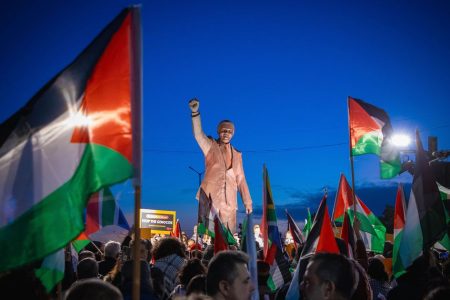CAPE TOWN, South Africa (AP) — Barely two weeks after he was released from prison in 1990, Nelson Mandela flew to Zambia to meet with African leaders who had supported his fight against South Africa’s apartheid system of forced racial segregation.
One figure stood out among the men in dark suits eagerly waiting to greet Mandela on the airport tarmac: Palestinian leader Yasser Arafat, wearing his black and white checkered keffiyeh headdress, had traveled to see the newly freed Mandela.
He grabbed Mandela in a bear hug and kissed him on each cheek. Mandela smiled broadly. It was confirmation of the solidarity between two men who considered their peoples’ struggles for freedom to be the same.
South Africans continue to support the Palestinian cause, and the country has taken the rare step of bringing a genocide case against Israel at the International Court of Justice because of its war in Gaza.
South Africa is not a diplomatic heavyweight and is geographically far from the conflict. But its ruling African National Congress, which Mandela led from an anti-apartheid liberation movement to a political party in government, has retained its strong pro-Palestinian stance even after Mandela died in 2013.
“We have stood with the Palestinians and we will continue to stand with our Palestinian brothers and sisters,” Mandela’s grandson, Mandla Mandela, said at a pro-Palestinian rally in Cape Town in October, days after the Hamas attack in southern Israel spurred the war on Gaza. Mandla Mandela, an ANC lawmaker, wore a black and white Palestinian keffiyeh around his neck as he spoke to a large crowd.

Media24/Gallo Images via Getty Images
A SHARED STRUGGLE
Nelson Mandela regularly raised the plight of the Palestinians. Three years after apartheid and white minority rule was dismantled in South Africa and Mandela was elected president in historic all-race elections in 1994, he thanked the international community for its help. He added: “But we know too well that our freedom is incomplete without the freedom of the Palestinians.”
Mandela and South African leaders after him compared the restrictions Israel placed on Palestinians in Gaza and the West Bank with the treatment of Black South Africans during apartheid, framing the two issues as fundamentally about people oppressed in their homeland. Israel provided weapons systems to South Africa’s apartheid government and maintained secret military ties with it up until the mid-1980s, even after publicly denouncing apartheid.
The ANC has consistently criticized Israel as an “apartheid state,” even before the current war. International rights groups have also accused Israel of the crime of apartheid against Palestinians and that “resonates strongly with South Africa,” said Thamsanqa Malusi, a South African human rights lawyer.
Israel adamantly rejects that characterization, saying its Arab minority enjoys full civil rights. It views Gaza, from which it withdrew soldiers and settlers in 2005, as a hostile entity ruled by the Islamic militant group Hamas, and it considers the West Bank to be disputed territory subject to peace negotiations — which collapsed more than a decade ago.
Malusi said many in the South African government experienced the oppression of apartheid and that could help explain its decision to lodge the case against Israel at the U.N.’s top court.
While Mandela, the Nobel Peace Prize-winning statesman, also reached out to Israel in an attempt to foster a peaceful solution, anti-Israeli rhetoric in South Africa has strengthened over the years, sometimes seeping into everyday life. For example, the ANC’s youth wing pressured South African grocery store chains to drop Israeli products and threatened to forcibly shut them down if they didn’t.
Issam Rimawi/Anadolu via Getty Images
RESPONSE TO THE WAR
Israel’s assault on Gaza sparked renewed solidarity with the Palestinian cause in South Africa. Thousands have marched in support of Gaza in Cape Town and Johannesburg, and buildings in the Cape Town neighborhood of Bo Kaap were adorned with pro-Palestinian graffiti in the weeks after the war broke out.
South African President Cyril Ramaphosa — the current leader of the ANC — has criticized both Israel and Hamas for what he calls atrocities committed by both sides in the conflict. But he also appeared in public wearing a keffiyeh and holding a Palestinian flag,…
Read More: Mandela’s Palestine Support Endures With Case Against Israel

